In
the Heat of the Night
1967
Director: Norman Jewison
Starring: Sidney Poitier, Rod Steiger,
Warren Oates
Message
films can be a difficult sell. They have
to make a point, a point they feel is terrifically important, and this usually
results in the filmmakers going to great lengths to drive that point home. Which, in turn, inevitably leads to heavy
handed and soggy films at which I wind up rolling my eyes.
This
is not the case with In the Heat of the Night, no sir,
not in the slightest. It has a point to
make, and it makes it fiercely, but it never once feels soggy or ham
fisted.
Cop
Sam Wood (Oates) comes across a dead body on his night patrol in the teeny Mississippi
town of Sparta. Police Chief Gillespie
(Steiger) is flummoxed, so when Wood finds a black man in the train station, he
thinks he has his killer. Turns out he
couldn’t be more wrong, as instead he found Philadelphia cop and expert
homicide detective Virgil Tibbs (Poitier), who slowly and reluctantly starts to
help the local cops solve the case while coming up against dangerous racial
prejudices at every turn.
The
performances and the smart writing, which work hand in hand with one another,
are what set In the Heat of the Night apart from other, lesser message
movies. This film was adapted from its
source novel with the specific intention of being a vehicle for Sidney Poitier,
and he fills the screen with his enormous, quiet, powerful charisma every
moment. Poitier, who barely utters more
than two dozen words in the first twenty minutes of the film as his character
is arrested without being questioned, nonetheless exudes a palpable feeling of
barely reigned in righteous indignation.
He holds such disdain for the bigoted people he finds himself surrounded
with, yet also knows that he has to be careful, too careful, in order to get
out of his situation alive. Poitier
exudes this frustration, only rarely allowing it to bubble to the surface, but
when it does, as in the famous scene where he slaps a rich and influential
white man after being slapped first, it is powerful and almost a little
frightening. Watch how he utterly
commands Harvey Oberst when he is locked in a jail cell with him by merely
raising a finger. In the half dozen
films or so that I’ve seen of Poitier’s, this is the role that feels most
iconic to me. When I think Sidney
Poitier, I think smart, reserved, unrelenting Virgil Tibbs.
Matching
Poitier every step of the way is Rod Steiger as Chief Gillespie, a role that
won Steiger his Oscar. As much as I love
Poitier in this film, I grudgingly admit that it is Steiger who has a more
challenging role to play. Gillespie has
to slowly, too slowly, come to terms with his own racial prejudices and begin
to overturn them, but never too quickly, and probably not altogether. What makes this movie work so well is the
central tension between Gillespie and Virgil Tibbs. Things are not resolved once it is revealed
that Tibbs is a cop; if anything, that’s just the beginning of the
turmoil. Steiger’s Gillespie keeps me on
my toes in this film as the very definition of unpredictable. One moment he’s practically begging Tibbs for
his help on the case, and the next he’s chucking him back on a train to go back
home. It’s this vacillation that Steiger
plays so well, laying bare for us a man who is very proud and cannot admit he
was wrong, yet he must, and does. In one
of the scenes leading up to the finale, Gillespie and Tibbs share a drink at
Gillespie’s house, and Gillespie starts a monologue about being lonely. The moment that Tibbs shows any empathy for
Gillespie, Gillespie retreats back into his hardened shell and tucks his soft
underbelly away from the barbs of the outside world. It’s a great scene, and a fantastic example
of what I mean when I say this film is never heavy handed about its
message. A lesser film would have the
two men crying in each other’s arms, overwhelmed with their newfound respect
for the other, but In the Heat of the Night, and Rod Steiger as well, knows that
things are rarely that simple. Gillespie
battles with himself every single step of the way, and Steiger is towering in
his portrayal of a prejudiced man learning to be better.
On
top of the two sizzling performances of the leads, I love how the detective
story unfolds in In the Heat of the Night.
Yes, In the Heat of the Night is first and foremost about racial
tensions, but it is also a murder mystery.
What I find interesting in how the mystery unfolds is that it is an
early example of how forensics and hard evidence are used to solve a case,
winning out over “gut” and “instinct” and “hunches.” Tibbs is a crackerjack Philly homicide cop
because he uses forensics; Gillespie is old school and relies on hunches, a
fact not helped along by his prejudices.
Tibbs has to fight Gillespie every step of the way with hard evidence,
and that’s frustrating, adding on another layer of tension to the already tense
film. Tibbs has to prove his story, and
he does it well, but with every new piece of evidence comes a new wrong
conclusion that must be fought.
Considering forensic crime dramas command a significant percentage of
the television airwaves these days, it may seem quaint to see such simplistic
evidence analysis in In the Heat of the Night, but
there’s something to be said for being an early trailblazer.
As
I watched In the Heat of the Night, I kept on thinking to myself “would a
black man today really get beat up, or even killed, just for being black?” I know how I’d like to answer that question;
I want desperately to say “No.” But then
I remember the all-too-recent case of Trayvon Martin, and I gulp down my
answer. And then I transplant the word
“black” with the word “gay,” and the question becomes even harder to
answer. Prejudice is still with us,
undeniably, as much as I wish it wasn’t.
The message in films like In the Heat of the Night, filled
with great performances and smart writing, are still just as relevant today,
even though I badly wish they weren’t.
Arbitrary
Rating: 9/10.
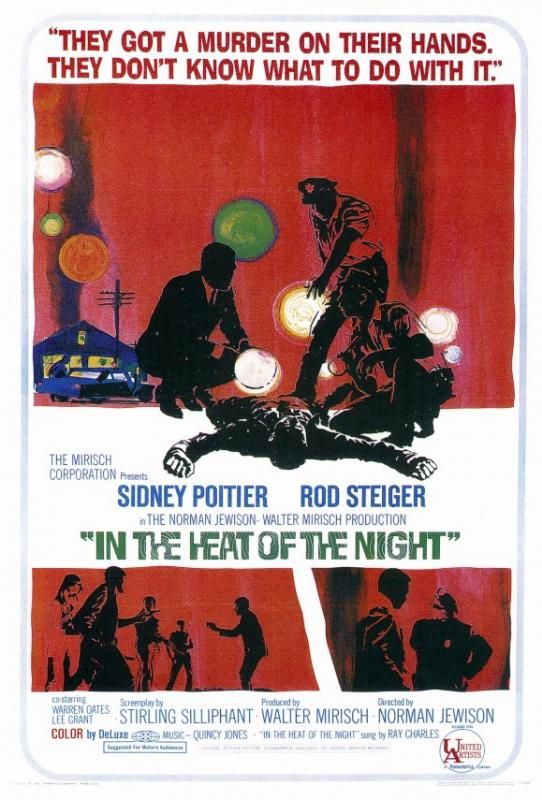
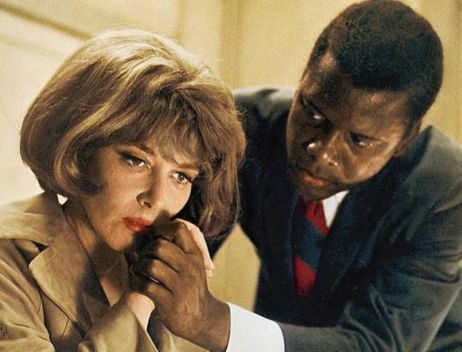
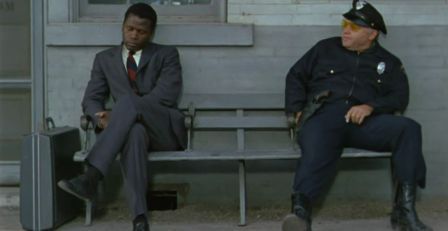
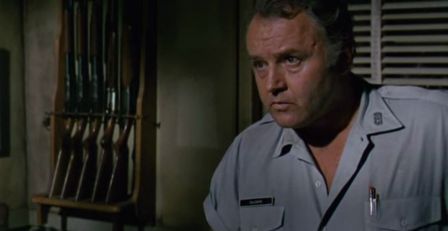
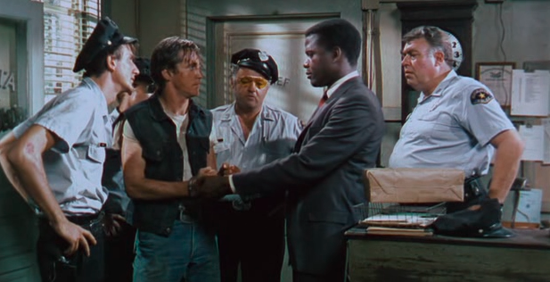
Good review. I liked this one quite a bit, too, although I never watched the sequel so I can't tell you if it's good or bad. I agree on both Poitier and Steiger.
ReplyDeletePeople of all races will still make assumptions about others based on how they look, skin color included. I remember the Rev. Jesse Jackson, during his campaign to reduce black on black violence, saying that nothing made him sadder than to be walking on a city street at night, hearing footsteps coming up behind him, seeing that it's a white man, and feeling relief.
That's a fascinating quote. Nice add. I know Poitier reprised the role of Virgil Tibbs several times, but I really have trouble imagining any sequel being as potent or effective as this original.
DeleteThe thing about this film that makes me love it (other than the slap--that's friggin' epic) is how smart it is with its development of the plot. The case put before us is really a simple one. The complications arise because of the prejudices of the two leads. They so want their pet theories to be correct that they completely ignore what's staring them in the face.
ReplyDeleteIn a lesser film, Virgil Tibbs would have been right all along. In a smart film, we get to see that he has his own prejudices just like everyone else. In a really smart film like this one, Tibbs learns that, too.
I think what you said here is what I was trying to get at (but couldn't say quite as concisely as you). In a lesser movie, both Tibbs and Gillespie would be 2D and follow a prescribed path. But they don't here. Yes, we know that Tibbs is our moral hero, but I love that even he gets blinded by his prejudices (and, as you note, then overcomes them). It makes everything so much richer, everything feels more real.
DeleteI didn't mention it here, but there's always the feeling, when I watch a movie as famous as this one, of "will it live up to its own hype?" It's always such a joy to find one that does.
Wow, I don't know if anyone would believe that I wrote my review of In the Heat of the Night before reading yours, seeing how many of our observations overlap. But I swear, that's just a testament to how what works about the flick really, REALLY works. Great write-up. :-)
ReplyDelete- Sunny D
Most definitely, this movie works, and hey, honestly, this is part of the fun of being in the 1001 Movies Blog Club. I like hearing what everyone else has to say about a movie, and, like on this occasion, having that neat moment of noticing the same things as someone else. And thanks!!
DeleteReally nice review. I had seen the movie before but ended up bumping my rating up a notch this time. It is just so darned entertaining and smart.
ReplyDeleteI'm glad I'm seeing most of these films for a second time before writing about them for that very reason; as time passes, your impression of a film changes, and films like this one only grow stronger. When I was first considering what to rate this, I said 8, but on watching it again, I, like you, decided to bump it up. It's SO good.
Deleteoff white shoes
ReplyDeletejordan 11
yeezys
supreme new york
canada goose jacket
curry shoes
golden goose
air jordan 1
jordan 13
yeezys